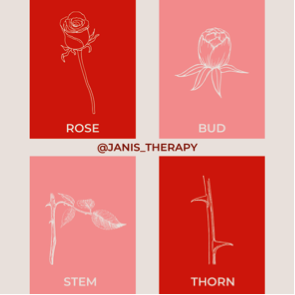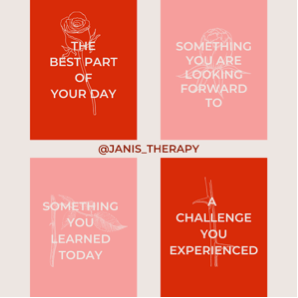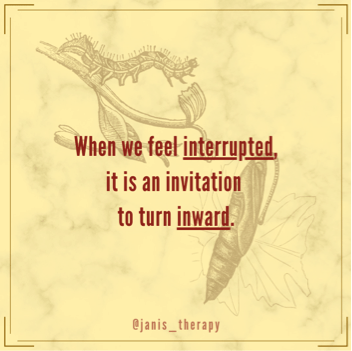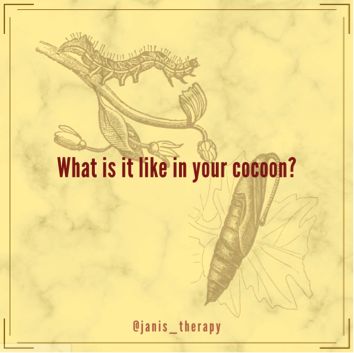In early May, I had the pleasure of hosting a two-hour IG Live with Autostraddle. In it, we discussed some of the things that are coming up for us, fifty or so days into quarantining and shut down. Though we’re all coming from different places and having different experiences, a lot of similar themes came up – mostly around anxiety, communication, and relationships, and how all three have changed or intensified in light of COVID19. Here’s a quick summary of some of the questions that were asked and things we discussed.
How should we deal with fraught communication and conflict under the external and internal pressures of trauma?
The first thing I noticed about this question is the use of the word “should.” This happens a lot in therapy – client either want to be given direct advice, or they police themselves with The Shoulds, which I find oftentimes is connected to judgment and fear of being bad or wrong. The longer I do therapy, the more I notice I’m resistant to giving advice – as good as giving advice feels! In fact, the fact that it feels good to give advice is why I resist it, to be totally honest – because it might feel good to me (meaning, it might make me feel like I’m doing a good job or being an effective therapist) but that doesn’t mean that the advise is gonna work for my client.
So my suggestion here is simply: Try to notice when The Shoulds are invading your thought process, and try to be curious about that. What is it The Shoulds are trying to protect you from? What does doing the “bad” or “wrong” thing mean? What is the cost of being a “bad” person? For me, much of the time this has to do with trying to avoid rejection or loss of care or connection. Care and connection, as explained in my piece on skin hunger, are survival needs. Many times, when we try to be “good” or do things the “right” way, we get stuck in patterns of acting from a place of fear. It’s important to remember that it is possible to meet our needs for care and connection while also being human rather than perfect, and that mistakes or missteps are natural parts of relationships. The challenge is to respond to them with patience and compassion – especially compassion for yourself
There’s no right way to deal with fraught communication and conflict, and both of those things are likely occurring with more frequency for at least some of us right now. Most of us are experiencing more anxiety, and one of the side effects of this can be increased irritation and impulsivity, speaking and acting without thinking, saying things we don’t mean. This, of course, can lead to hurt feelings and misunderstandings – rupture is what we call it when it happens in the therapy session – that will then need to be repaired. If I’m going to give any advice around this it is simply: Try to accept without judgment that these things are going to happen, and then pay attention to what you need in the moment. Also – conflicts don’t need to be solved or fixed right away! It’s okay to take some time & space to figure out how you’re feeling, move through the moment of trauma or emotional activation (move through that fight/flight/freeze moment) and then return to the conversation again, hopefully with a little more self-awareness and groundedness.
How can I quiet my anxiety when I currently don’t have access to the means I use to quiet it?
The first thing I noticed about this question was that the work was already being done, even if the writer wasn’t able to realize it. What I mean by this is – there’s already an awareness of the LW’s mind in it’s jumbled state, which for me is the starting point for mindfulness, or the possibility of observing the workings of your mind with some distance and non-judgment. This is an incredibly important baseline for cultivating a practice of self-soothing through anxiety, and it’s already in place. This is really important, because to me it signals that we’re not helpless, we’re not powerless, and we already contain within us the seeds of what we need to help ourselves through difficult moments like this one.
So, yes, the means we normally have to quiet our anxieties are not accessible to us right now. We can’t go out and spent time on a friend’s couch, being seen and held through our fears and despair. Some of us are quarantining far away from our friends and family, and while a FaceTime call or Zoom session is great, it’s not the same as a long hug, or having someone run their fingers through your hair. Gyms are closed, so if you’re like me and rely on burning through anxiety physically, it can be challenging to find things to do inside that replicate that experience. Even going for a walk outside can be really scary and uncomfortable, or even impossible, depending where you are and what is accessible to you based on ability and illness.
There are still things we can do to practice mindfulness even if we’re flat out laying in our beds. I like this adaptation of the rose/thorn mindfulness exercise, introduced to me early on in quarantine by my friend Emily Varnam, a doula and activist whose IG and stories have been consistently full of warmth, generosity, vulnerability and encouragement for gentleness and patience as we move through this pandemic together.
In it, you’re asked to identify several different aspects of your day: the best part (rose), the most challenging or difficult part of your day (thorn), something you’re looking forward to (bud), and something you learned (stem). I like this because it reminds us that no one moment or emotional state is permanent, even in the darkest of times. We move through so many states over the course of the day, often without noticing it. But taking the time to notice, you may find, can sometimes open up your perception. With exercises like this, it’s easier to resist getting caught up the all or nothing that anxiety and depression can sometimes coax us into (“Everything feels like it’s dialed up to 1000”) and give ourselves a little bit of a break.
Splitting
Speaking of all or nothing thinking, in our Live last week, we also talked about the phenomenon of splitting, the cognitive distortion of the false dichotomy, or viewing the world through extremes. This is super common and, at one point, probably served a pretty important purpose for you, so it’s nothing to feel ashamed of! In times of chaos, when trauma is held so close to the surface, splitting gave us a quick and easy way to determine who is safe (and therefore good) and who is not (and therefore bad, and to be avoided). Well, we’re all experiencing chaos and trauma right now, together, so if this pattern is coming up for you again now, it makes sense!
This is where patience and curiosity come in, as well as paying attention to key words: Notice when you find yourself thinking things like: everything, always, and never. What context do those words start popping up in your thoughts? Do they relate to you? Your relationships? What feelings come attached to them? What meaning or stories are you creating in those moments? When you tell yourself those stories, how do you feel? Often we create stories of how we (or our friends, loved ones, partners) always or never are in order to move away from uncertainty and ambiguity, and the anxiousness and fear that can arise alongside that uncertainty and ambiguity. Way to go, us, then for trying to find a way to soothe ourselves through hard-to-feel emotional states. Now, knowing that our bodies and minds are always trying to take care of us, to get us surviving to the next moment and the next moment, what would it be like to gently, and maybe only for a few moments at a time, sit with that anxiety? Try to reach for that observer state where you noticed the jumbled state of your mind: What is it like to sit with your fears? What happens in your body? Does your heart rate increase? Does your breathing change? Do your palms sweat and tingle? Do these sensations change over time as you observe them? What is that like for you?
Here are a few more links and resources:
Substance Use
We talked, briefly, about increased substance use while quarantining. While I’m not specifically trained as an addiction counselor, I do practice from a harm reduction perspective, and as such I want to note that addiction is still deeply pathologized and folks feel a lot of shame around substance use. To quote Clementine Morrigan, though, “We can’t shame ourselves into healing.” Oftentimes, we turn to substance use in an effort to self-soothe in the aftermath of trauma, anxiety, and depression. Again, it is your body’s way of attempting to regulate, to stay safe, and survive. Does this context help loosen some feelings of shame around substance use? What is it you are trying to soothe or ease via drinking, or pot use, etc.? In terms of concrete resources, I signed up for Tempest, and have been getting weekly newsletters full of links to podcasts, articles, books, and guided meditations, that might be a good place to start with regard to substance use and recovery in the context of social distancing.
Sleep
A couple of you described difficulty falling asleep at the end of the day, citing whirring minds that refused to quiet down. I like this three part yoga nidra podcast out of UCLA to help me calm down and quiet my mind enough to sleep – often times, I barely make it through the first twelve minute segment before I knock out. Be aware: The first part is a body scan, so if you have a trauma history that makes body awareness difficult or triggering, keep that in mind. There are also other yoga nidra videos and guided meditations available on YouTube and Spotify, if you don’t have access to Apple Podcasts.
Dating
We also talked about dating, and how relationships in the early stages of dating have been interrupted by the pandemic, or how difficult it is to continue dating while in quarantine. Some of you were feeling “pointless” about dating, since we don’t know when we’ll be able to meet in person again, or whether the people we’re texting with now will have chemistry with us when the time comes to meet in person. This is super real, and there’s no easy answer for it – and maybe there’s also an opportunity to reframe. What if we look at this time as a way of being really observant of some of our automatic narratives and constructs around dating, like, for example, that there has to be a “point” or an “outcome” (hello, capitalism) inherent in every social interaction, specifically ones involving romance or sex. We have an opportunity now to deeply engage with folks on a different, slower, level. As we talked about this in the Live, I found myself imagining relationships that start out slow, with letter writing (maybe conducted over email now), and romance that makes distance and longing erotic rather than isolating.
Nostalgia
One of my favorite parts of the conversation was when we talked about nostalgia. Even in the segment above, about romance and letter writing and even fantasy, I feel like the concept of nostalgia is very present. One participant talked about how they didn’t want to romanticize their youth too much in this moment, to which I said…Why not? What’s the harm in romanticizing our youth every now and then? Reflect on your earlier experiences like watching a movie. You’re the protagonist. The hero. You faced down challenges, and survived. Add music to your recollections! Past You was in a YA novel, what’s the soundtrack to it? Imagine you are the hero your younger self needed back then; does that change what nostalgia feels like for you? Nostagia is also related to homesickness (nóstos = “homecoming” in Greek, -algia = pain or ache.) What are you homesick for, in these quiet moments, in solitude? What comes up when you feel that ache?
We also talked about how much we feel interrupted by this moment, disappointed or afraid of the way our career trajectories need to change and shift or pause. It made me think of this incredible piece by Tiara DeGuzman about “career cocooning.” Remember: Things like “momentum” and “linear progress” are capitalist ideals. To quote adrienne maree brown’s #pandowrimo prompt, “What are you courageous enough to stop normalizing?” What would it be like to give yourself permission to turn to goo? What’s it like in your cocoon?







This was so helpful! Thank you. <3 :)
Yeah really helpful…I feel like we all need all the help we can get with this stuff right now!
The most important thing is not to give in to general panic. This leads to stress and sad consequences. I advise you to find a suitable remedy that can calm you down, study in more detail DailyCBD.com
I feel like we all need all the help we can get with this stuff right now!